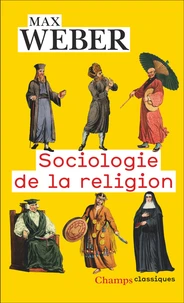Max Weber (1864-1920), économiste allemand, père de la sociologie contemporaine. Né dans une riche famille de la bourgeoise protestante allemande, M. Weber entame des études en Droit et accède au poste de professeur d'Histoire de droit romain et de droit commercial à Berlin (1893) puis à Fribourg (1894). Souffrant de dépression nerveuse, il visite l'Italie et le sud de la France, et c'est à la suite de ce voyage qu'il réoriente ses recherches vers la sociologie dont il fonde en 1909, avec G. Tönnies et G. Simmel, la Société allemande de sociologie. Les années 1915-1919 sont pour Weber une grande période d'activité intellectuelle avec la publication de ses travaux sur la sociologie comparative des religions mondiales. Il meurt peu après avoir obtenu la première chaire de sociologie à Munich. Mal connue en France, la pensée wébérienne s'appuie le processus de rationalisation de la modernité occidentale par de nombreux exemples historiques.
The Protestant Ethic and the "Spirit" of Capitalism. and Other Writings
Par : , ,Formats :
Disponible dans votre compte client Decitre ou Furet du Nord dès validation de votre commande. Le format ePub protégé est :
- Compatible avec une lecture sur My Vivlio (smartphone, tablette, ordinateur)
- Compatible avec une lecture sur liseuses Vivlio
- Pour les liseuses autres que Vivlio, vous devez utiliser le logiciel Adobe Digital Edition. Non compatible avec la lecture sur les liseuses Kindle, Remarkable et Sony
- Non compatible avec un achat hors France métropolitaine
 , qui est-ce ?
, qui est-ce ?Notre partenaire de plateforme de lecture numérique où vous retrouverez l'ensemble de vos ebooks gratuitement
Pour en savoir plus sur nos ebooks, consultez notre aide en ligne ici
- Nombre de pages464
- FormatePub
- ISBN1-101-09847-3
- EAN9781101098479
- Date de parution30/04/2002
- Protection num.Adobe DRM
- Taille2 Mo
- Infos supplémentairesepub
- ÉditeurPenguin Classics
Résumé
In The Protestant Ethic, Max Weber opposes the Marxist concept of dialectical materialism and relates the rise of the capitalist economy to the Calvinist belief in the moral value of hard work and the fulfillment of one's worldly duties. For more than seventy years, Penguin has been the leading publisher of classic literature in the English-speaking world. With more than 1, 700 titles, Penguin Classics represents a global bookshelf of the best works throughout history and across genres and disciplines.
Readers trust the series to provide authoritative texts enhanced by introductions and notes by distinguished scholars and contemporary authors, as well as up-to-date translations by award-winning translators.
Readers trust the series to provide authoritative texts enhanced by introductions and notes by distinguished scholars and contemporary authors, as well as up-to-date translations by award-winning translators.
In The Protestant Ethic, Max Weber opposes the Marxist concept of dialectical materialism and relates the rise of the capitalist economy to the Calvinist belief in the moral value of hard work and the fulfillment of one's worldly duties. For more than seventy years, Penguin has been the leading publisher of classic literature in the English-speaking world. With more than 1, 700 titles, Penguin Classics represents a global bookshelf of the best works throughout history and across genres and disciplines.
Readers trust the series to provide authoritative texts enhanced by introductions and notes by distinguished scholars and contemporary authors, as well as up-to-date translations by award-winning translators.
Readers trust the series to provide authoritative texts enhanced by introductions and notes by distinguished scholars and contemporary authors, as well as up-to-date translations by award-winning translators.


















